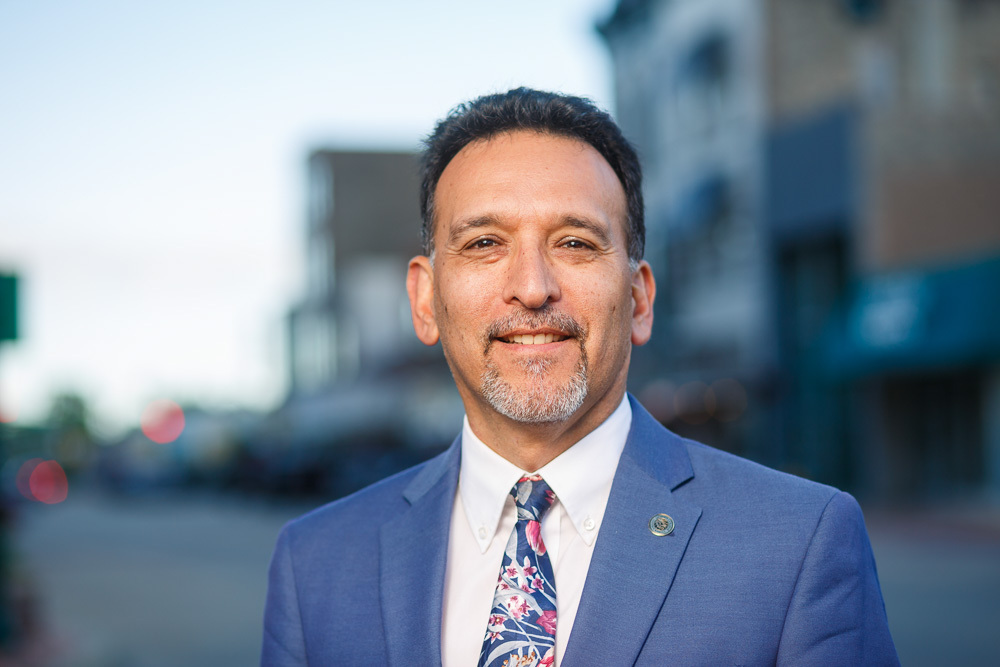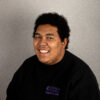Gilberto Perez Jr., dean of Students at Goshen College, is receiving an award, but that is one of the last things on his mind.
Perez is being recognized by his alma mater, Eastern Mennonite University (EMU), in Harrisonburg, Virginia. The Distinguished Service Award is awarded annually to a graduate of EMU who has made an outstanding contribution to EMU, the church or the greater community.A 1994 EMU graduate, Perez has crossed off all these requirements and more in his postgraduate life. Whether creating mental health curriculum for immigrants from Latin America, helping bring churches and law enforcement together in Goshen or working to change the culture of Goshen College, Perez is a busy man.
Perez started his undergraduate life at Hesston College in Kansas before moving on to EMU, where he earned a bachelor’s degree in social work in 1994. He moved on to San Juan, Puerto Rico, for graduate school, where he started his work as a social worker before moving to Indiana.
“Take chances, check your bases, but do it,” Perez said of college education.
About 10 years ago, Perez wrote a mental health curriculum that was intended for immigrants coming from Latin America. His work turned into a partnership with the state of Indiana, training mental health professionals. He then got a contract with the University of South Florida, which introduced this curriculum to 14 states.
Before becoming dean of students, Perez did work with the Latino community, which included working with churches and police officers and doing consulting work for Latino entrepreneurs. Perez’s work with churches has been predominantly r with Latino churches and police stations to help immigrants understand what police officers are looking for when they see people driving.
In his consulting work, he has partnered with the Mexican consulate to provide funds and resources to young Latino entrepreneurs to build better businesses.
In his work with the Latino community, Perez’s goal is to “build community within the Latino community, to move towards integration.”
Perez’s biggest influence for his work is personal experience. He remembers growing up seeing people immigrating north in the 1980s and how that affected him.
In college, he took a semester off and traveled around to the country singing with two other EMU students. They left with about $300 and returned to college with about $5,500. The group took the money and put it in a mutual fund and about ten years later they donated the money back to the college. The men told the university to give the money to anyone who wants to do what they did during college.
And while Perez has worked hard for all he has accomplished, he makes a point of saything that he has had vital mentors in his life.
Charles Caldera, an old band instructor, is one of them. Perez was a talented band member and was first chair in the top band, but he was a talker. Perez recounts that to get him to focus, Caldera moved Perez to the ‘B’ band, and that the figurative shaking made him focus.
Another mentor for him was Hank Belderrama, a therapist from Washington. Perez found Belderrama influential because of his strong familiarity with dichos, or commonly repeated Spanish proverbs. Perez is most thankful for Belderrama’s reminder to always make sure Perez knows where he comes from. He hopes that this reminder has been ingrained in him enough that he would be able to pass that onto students on campus.
Perez will be traveling to receive the Distinguished Service Award award at EMU. He will be receiving the award on October 14, during Eastern Mennonite University’s homecoming weekend.
At GC, Perez continues in his role as dean of students and looks to change the culture of Goshen College’s student life from punitive discipline to restorative discipline.
“[I don’t want] Res Life and Student Life to be where people feel like we are out to get you,” he said.
“College is a place to experiment and figure out who you are,” Perez said, and he hopes that Residence Life and Student Life can continue to help students achieve this goal.




